
The following text is taken from the cover of each book.
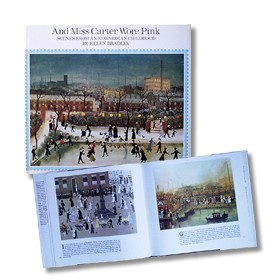
ew artists have captured the flavour of an Edwardian childhood like Helen Bradley. Born in Lees, a village outside Oldham, in 1900, Helen Bradley was over sixty when she began to paint - to show her small granddaughter what life was like when she herself was a child. Her bright, teeming pictures and her own delightful narrative memorably reflect that gentle period - market day, an outing to Blackpool, fairgrounds and funerals, bread-baking, a day at the races, carol-singing in the snow. Those same loved characters make their appearance: three maiden aunts with their sweeping muslin skirts, their friend Miss Carter (who always wore pink), Mr. Taylor the Bank Manager, and the dogs Gyp and Barney.
Primitive in style, idyllic in mood, Helen Bradley's pictures are as accomplished as they are imaginative. 'And Miss Carter Wore Pink', her first and best known book, will never cease to be a pleasant reminder of that time when, as Helen Bradley put it "even the weather was kinder".
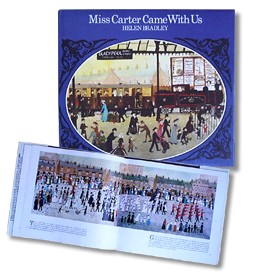
f you can imagine a combination of Kathleen Hale's Orlando books, which have an innocence totally free from whimsy, Daisy Ashford's ingenuousness in THE YOUNG VISITORS and Lowry's pictures of the industrial north, then Helen Bradley's painting has something of all these. With these words The Times greeted the publication of the now celebrated AND MISS CARTER WORE PINK. The lovely colors, the charm and activity of all the characters have won Helen Bradley, a 73-year-old grandmother of seven, a devoted following. Her paintings have sold for as much as £2,000 apiece, and novelist John Fowles called her best-selling book "the best Christmas card of the decade".
In MISS CARTER CAME WITH US Helen Bradley depicts life in Lancashire throughout the whole year of 1908. "My pictures are a love story of that gentle period," she says. The same loved characters of the previous book make their appearance-the three maiden aunts in their graceful muslin skirts, their friend Miss Carter (who wore pink), Willie Murgatroyd, the mill lad who was always fighting, Helen herself and her brother George, the dogs Gyp and Barney. Whether the scenes and their delightful, gay commentary depict shopping trips, a picnic party, holiday fun in Blackpool, Christmas Day, or even a suffragette meeting (where Miss Carter fainted), they add up to a beguiling look back at an Edwardian child-hood than can only evoke nostalgic envy in the 1970s.
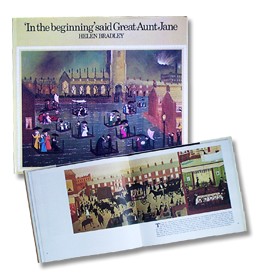
or Helen Bradley as a small child Tuesday afternoons up Springhead were very special, because Great-Aunt Jane could tell the most beautiful stores about God. "In the beginning," she would always start off, and on she would go with wonderful tales of how God had lit the stars with his matches to get rid of some of the blue-velvet void, how he polished the Sun with Brasso, and of the terrible rain that came when he went to Manchester and left the tap on.
The gay, graceful Edwardian magic of the Miss Carter books is here deftly coloured with Helen Bradley's childhood visions of the Almighty at his daily work - that exciting time when fish and chips were served for tea as a special treat on Judgment Day, when Adam and Eve could be found at Blackpool, and God lived up in the shed on the moors.
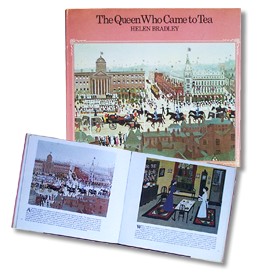
t was a time when a great new adventure was beginning for women, when Aunt Mary led a band of suffragettes and even had her picture in the paper for shouting "Votes for Women" in the House of Commons, which made Helen Bradley's father very cross. Winston Churchill became their M.P. and Father was convinced that motor cars would never catch on, but bought one all the same. There were exciting holidays and new things to see: a three-masted schooner at the quay in Douglas, pierrots on the sands at Blackpool and Grandpa's new house on the Isle of Man which he bought with the thought that the sail backwards and forwards would do the family good. But most exciting was the day King Edward and Queen Alexandra rode through the streets of Manchester, a scene which Helen Bradley re-creates as she saw it from atop her Uncle John's shoulders. The next day Aunt Mary assured her that the Queen had indeed come to tea, as Grandma said she might, after the children had gone to bed, and Her Majesty had gratefully learned the secret of making proper Yorkshire pudding.
The delights of an Edwardian childhood, from a new pair of curling tongs to the roundabout at Lees, are nowhere recaptured with more charm than in the incomparable pictures of Helen Bradley.
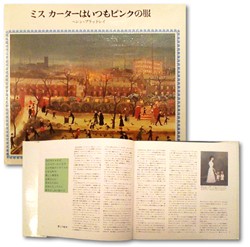
Helen Bradley's books have been translated into German, French, Dutch and Japanese.